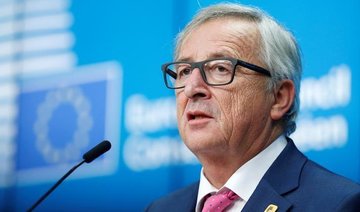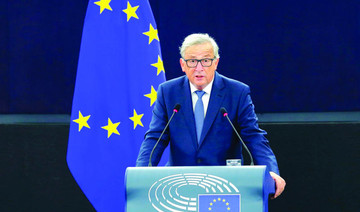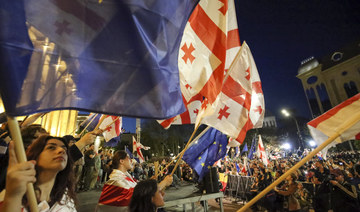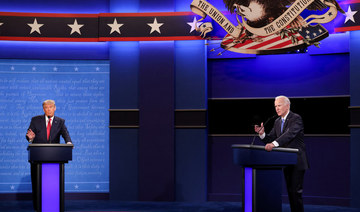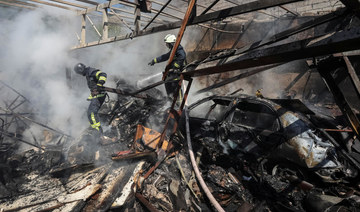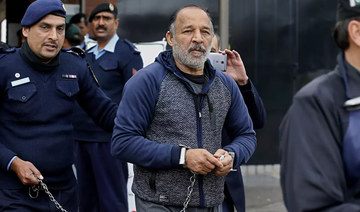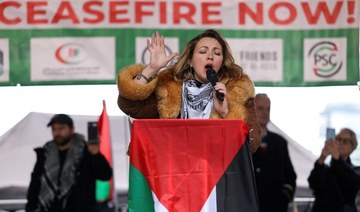STRASBOURG, France: European Commission President Jean-Claude Juncker said in a flagship speech Wednesday that the “wind is back in Europe’s sails” after last year’s shock Brexit vote, an act he insisted Britain would regret.
In his annual State of the Union address to the European Parliament, Juncker said the troubled bloc had become more united in the past 12 months and stressed that economic momentum was picking up.
The former Luxembourg premier urged deeper integration across the board, calling for more states to join the euro and the passport-free Schengen area, and proposing a single EU chief and dedicated pan-European finance minister.
“All this leads me to believe the wind is back in Europe’s sails,” Juncker told MEPs in the French city of Strasbourg, in a speech that mixed English, French and German.
“We have now a window of opportunity but it will not stay open forever. Let us make the most of the momentum, catch the wind in our sails.”
Juncker did not utter the word “Brexit” until the very end of his 80-minute speech, saying that “we will regret it, but you will regret it too,” earning jeers from British euroskeptics in the chamber.
“We must respect the will of the British people, but we will move forward, we will move forward — because Brexit is not everything, because Brexit is not the future of Europe,” the veteran politician added.
British euroskeptic leader Nigel Farage responded to Juncker’s plans by telling him: “Thank God we’re leaving — you’ve learnt nothing from Brexit.”
While a future EU-UK trade deal remains a distant prospect, Juncker called on the bloc to seal trade deals with Australia and New Zealand by the end of his mandate.
The 62-year-old has two years left in office as head of the EU’s powerful executive arm to ensure that his legacy is not limited to the departure of one of the European Union’s largest member states.
He struck a far more optimistic tone than when he stood at the podium in September 2016, admitting then that “it was plain for all to see that our union was not in a good state, battered by a year that shook our very foundations.”
With the rise of populism — after Brexit and the election of US President Donald Trump — apparently at bay for now, and growth returning after the debt crisis, Juncker said there were reasons to be cheerful.
He looked ahead to the day after Britain’s departure on March 29, 2019, saying Europe should “throw off the bowlines, sail away from the harbor” — and have another summit, in Romania.
Juncker called for an elected “single president” to lead the EU, merging his job as head of the European Commission, the bloc’s executive arm, and the president of the European Council of member states, currently held by Donald Tusk.
He said Bulgaria, Romania and Croatia should all finally become full members of the Schengen zone, which allows free movement of people and open borders between European countries.
The eurozone should meanwhile be expanded beyond the 19 countries that currently use the single currency, in line with the EU’s treaties that say all states must join the euro.
Juncker furthermore backed French President Emmanuel Macron’s call for a pan-European finance minister, a big step toward deeper integration of the eurozone, whose proponents want to see further united to tackle any future crisis.
His call for increased cooperation was however balanced with the need to heal a deepening split with eastern European countries that resist any move to further integration.
Juncker nevertheless lashed out at EU countries that breach the “rule of law” — a swipe at Poland and Hungary which have been at odds with Brussels over democratic standards.
Turkey was also on the receiving end of Juncker’s barbs, as he urged Ankara to “let our journalists go” following the jailing of several European reporters.
Turkey’s own long-stalled membership bid was ruled out “for the forseeable future” as a result of President Recep Tayyip Erdogan’s crackdown following a coup attempt last year, he said.
Juncker says ‘wind back in Europe’s sails’
Juncker says ‘wind back in Europe’s sails’

Georgian police disperse protesters as parliament approves ‘foreign bill’ second reading
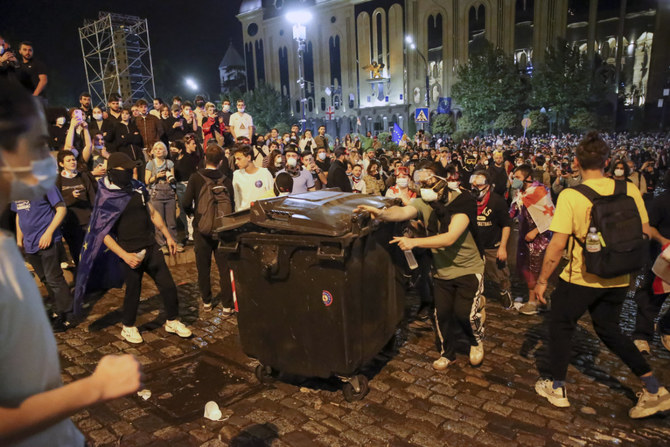
- 11 people, including six police officers, were injured after Wednesday’s altercations, say health ministry officials
- Critics have dubbed the bill “the Russian law,” saying it is inspired by laws used to suppress dissent in Vladimir Putin’s Russia
TBILISI: Georgia’s parliament on Wednesday approved the second reading of a bill on “foreign agents” that has been criticized as Kremlin-inspired, as police fired tear gas and stun grenades to clear a large crowd of protesters opposed to the draft law.
The bill, which would require organizations receiving more than 20 percent of their funding from abroad to register as agents of foreign influence, has sparked a rolling political crisis in the South Caucasus country.
Ever-growing numbers of protesters have been taking to the street nightly for almost a month, with a heaving crowd tens of thousands strong shutting down central Tbilisi on Wednesday, the largest anti-government demonstration yet.
Georgia’s Health Ministry, in a bulletin quoted by Georgian media, said 11 people, including six police officers, had received hospital treatment after Wednesday’s altercations.
Deputy Interior Minister Aleksandre Darakhvelidze, quoted by Georgian media, said protesters had tried to push their way into parliament using various objects and were attacking policemen.
Darakhvelidze said police action on Tuesday resulted in 63 arrests and six police officers injured.
President says to look to the election
Georgian President Salome Zourabichvili, who opposes the bill but has only largely ceremonial powers, told protesters in a video posted on social media to show restraint. The real task, she said, was to oust the government in an October election.
“Our fate will not be determined by this law,” she said in comments quoted by media. “This fight will take place in the forthcoming parliamentary election after which (this) law and many others will be rescinded.”
Georgian media cited the country’s Orthodox Church, one of its most respected institutions, as calling for the government and protesters to hold talks to resolve a “political crisis.”
Protester Sergi Kapanadze said that for him the protest movement amounted to a struggle for Georgia’s national survival.
“What are we afraid of more?” he told Reuters. “Being gassed, being beaten up, or losing the country?“
Georgian critics have dubbed the bill “the Russian law,” saying it is inspired by laws used to suppress dissent in Vladimir Putin’s Russia. Russia is unpopular among many citizens of Georgia, which lost a brief war with Moscow in 2008.
Both the head of the European Commission, Ursula von der Leyen, and the EU’s foreign policy chief, Josep Borrell, condemned the violence. The EU gave Georgia candidate member status in December but has said the bill could halt its integration into the bloc.
Police cleared the crowd by the parliament building using tear gas and stun grenades fired from within the fortress-like complex. Water cannon were also deployed.
Protesters regrouped, with some lighting a bonfire outside parliament, and others attempting to build makeshift barricades to block key roads. A Reuters eyewitness saw at least one man carried away from the action, his face bloodied.
The protests have pitched the ruling Georgian Dream party against a coalition of opposition parties, civil society groups, celebrities and the president.
Parliament, controlled by Georgian Dream and its allies, voted to advance the bill, prompting a boos from protesters outside. The bill must pass one more vote before becoming law.
Wednesday’s parliamentary debate was tense, with opposition members expelled and scuffles between legislators, a not uncommon occurrence in Georgia’s often-rowdy parliament.
One pro-government deputy was seen throwing a book at opposition legislators, while others shouted and physically confronted opponents.
Levan Khabeishvili, leader of the United National Movement party, Georgia’s largest opposition bloc, spoke in parliament with his face heavily bandaged. His party said he was beaten by police at the previous day’s protest, leaving him with concussion, broken facial bones, and missing four teeth.
The bill’s supporters, including Bidzina Ivanishvili, the billionaire founder of Georgian Dream and former prime minister, say the law would bolster sovereignty amid what he said were Western attempts to pit Georgia against Russia.
Trump calls judge ‘crooked’ after facing a warning of jail time if he violates a trial gag order

- The former president is trying to achieve a balancing act unprecedented in American history by running for a second term as the presumptive Republican nominee
WAUKESHA, Wisconsin: Donald Trump returned briefly to the campaign trail Wednesday and called the judge presiding over his hush money trial “crooked” a day after he was held in contempt of court and threatened with jail time for violating a gag order.
Trump’s remarks at events in the battleground states of Wisconsin and Michigan were being closely watched after he received a $9,000 fine for making public statements about people connected to the criminal case. In imposing the fine for posts on Trump’s Truth Social account and campaign website, Judge Juan M. Merchan said that if Trump continued to violate his orders, he would “impose an incarceratory punishment.”
“There is no crime. I have a crooked judge. He’s a totally conflicted judge,” Trump said speaking to supporters at an event in Waukesha, Wisconsin, claiming again that this and other cases against him are led by the White House to undermine his campaign.
The gag order bars him from making public statements about witnesses, jurors and some others connected to his hush money case. Trump is still free to criticize Merchan.
The former president is trying to achieve a balancing act unprecedented in American history by running for a second term as the presumptive Republican nominee while also fighting felony charges in New York. Trump frequently goes after Merchan, prosecutors and potential witnesses at his rallies and on social media, attack lines that play well with his supporters but that have potentially put him in further legal jeopardy.
Trump insists he is merely exercising his free speech rights, but the offending posts from his Truth Social account and campaign website were taken down. Merchan is weighing other alleged gag-order violations and will hear arguments on Thursday.
Trump has often called this case and other criminal cases against him “election interference,” saying they keep him from campaigning for the presidential election in November.
Attendees agreed he is being unfairly prosecuted, contending the trial and gag order were designed to distract him .
“It’s a trial looking for a crime,” said Ray Hanson, of Hartford. Hanson said he expected Trump’s lawyers would “keep him in line” so he doesn’t violate the gag order, as much as he likely wants to talk about the trial.
Manhattan prosecutors have argued Trump and his associates took part in an illegal scheme to influence the 2016 presidential campaign by purchasing and then burying negative stories. He has pleaded not guilty.
Trump’s visits to Wisconsin and Michigan mark his second trip to the swing states in just a month. For the previous rallies, the former president largely focused on immigration, referring to people who are in the US illegally and who are suspected of crimes as “animals.”
Meanwhile, Democrats are hoping to remind voters ahead of these visits about Trump’s position on abortion, which Trump has been openly concerned about being a political liability for him and Republicans.
Democratic Gov. Gretchen Whitmer of Michigan met on Wednesday with half a dozen women, including a family doctor, and warned that a second Trump term would threaten abortion rights even in her state, which enshrined those rights in its state constitution after the Supreme Court overturned national rights to the procedure.
Whitmer appeared with the women at a bookstore in Flint surrounded by signs that read “Stop Trump’s Attacks on Health Care” and “Stop Trump’s Abortion Ban.” She told reporters not to believe Trump’s contention in a Time Magazine interview that Republicans would never have enough votes in the US Senate to pass a national abortion ban.
“We cannot trust anything that Donald Trump says when it comes to abortion. So no one should take any comfort in the fact that, yes, he wants an abortion ban, but he won’t get it because he doesn’t think we’ll have 60 votes in the Senate. Baloney,” she said. “No one would have imagined we’d be here in this moment.”
Wisconsin and Michigan are among a handful of battleground states expected to decide the 2024 election.
For Trump to win both states, he must do well in suburban areas like the areas outside of Milwaukee and Saginaw, Michigan, where he will hold Wednesday’s events. He underperformed in suburban areas during this year’s primary even as he dominated the Republican field overall.
Trump has repeatedly falsely said that the 2020 election was stolen from him. Trump’s losses in battleground states in 2020 have withstood recounts, audits and reviews by the Justice Department and outside observers.
US accuses Russia of using ‘chemical weapon’ in Ukraine

WASHINGTON: The US State Department accused Russia Wednesday of having used a chemical weapon against Ukrainian forces in violation of the Chemical Weapons Convention, while also announcing fresh sanctions against Moscow.
In addition to the chemical agent chloropicrin, Russia also used “riot control agents (tear gas) as a method of warfare in Ukraine, also in violation of the CWC,” the department said in a factsheet.
“The use of such chemicals is not an isolated incident, and is probably driven by Russian forces’ desire to dislodge Ukrainian forces from fortified positions and achieve tactical gains on the battlefield,” the State Department said.
Meanwhile the US Treasury Department announced sweeping sanctions aimed at crippling Russia’s military and industrial capabilities — including targeting nearly 300 entities in Russia, China and other countries accused of supporting President Vladimir Putin’s invasion.
The sanctions are meant to punish companies that help Moscow acquire weapons for its war in Ukraine. They also target Russian government entities and companies involved in the country’s chemical and biological weapons programs.
Russia has said it no longer possesses a military chemical arsenal, but the country faces pressure for more transparency over the alleged use of toxic weapons.
According to the US National Institutes of Health, the chemical chloropicrin is used both as a warfare agent and pesticide. If inhaled, it poses a health risk.
“Today’s actions will further disrupt and degrade Russia’s war efforts by going after its military industrial base and the evasion networks that help supply it,” Treasury Secretary Janet Yellen said in a statement.
The accusations and sanctions come a week after US President Joe Biden signed a much-delayed bill to provide new funding for Ukraine as Kyiv’s military struggles to hold back Russian advances.
“Even as we’re throwing sand in the gears of Russia’s war machine, President (Joe) Biden’s recently-passed National Security Supplemental is providing badly-needed military, economic, and humanitarian support to bolster Ukraine’s courageous resistance,” Yellen said.
“Combined, our support for Ukraine and our relentless targeting of Russia’s military capacity is giving Ukraine a critical leg-up on the battlefield.”
As part of the measures, the State Department blacklisted additional individuals and companies involved in Moscow’s energy, mining and metals sectors.
The sanctions also targeted individuals connected to the death of Russian opposition leader Aleksey Navalny who died in a Siberian prison in February.
The almost 300 targets sanctioned included dozens of actors accused of enabling Russia to acquire desperately needed technology and equipment from abroad, the Treasury said.
Some of those targeted were based in countries such as China that have faced increasing pressure from Washington over support for Russia during its 15-month invasion of Ukraine.
“This support enables Russia to continue its war against Ukraine and poses a significant threat to international security,” the Treasury Department said.
Other than China, targeted non-Russian entities were located in Azerbaijan, Belgium, Slovakia, Turkiye, and the United Arab Emirates.
These companies “enable Russia to acquire desperately-needed technology and equipment from abroad,” the statement said.
Drone footage shows devastation in Ukraine’s strategic eastern city of Chasiv Yar as Russians advance
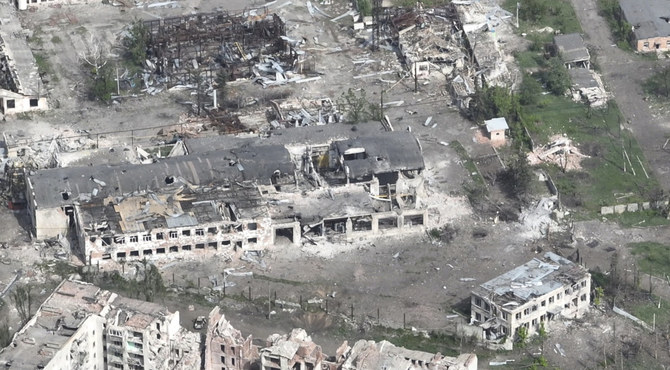
- The destruction is reminiscent of the cities of Bakhmut and Avdiivka, which Ukraine yielded after months of bombardment and huge losses for both sides
- Russia launched waves of assaults against Chasiv Yar’s outnumbered defenders as Ukraine's US and European allies dilly-dallied on sending fresh supplies
KYIV, Ukraine: Months of relentless Russian artillery pounding have devastated a strategic city in eastern Ukraine, new drone footage obtained by The Associated Press shows, with barely a building left intact, homes and municipal offices charred and a town that once had a population of 12,000 now all but deserted.
The footage shows Chasiv Yar — set amid green fields and woodland — pounded into an apocalyptic vista. The destruction is reminiscent of the cities of Bakhmut and Avdiivka, which Ukraine yielded after months of bombardment and huge losses for both sides.
The strategically important city has been under attack by Russian forces for months. Capturing it would give Russia control of a hilltop from which it can attack other cities that form the backbone of Ukraine’s eastern defenses.
That would set the stage for a potentially broader Russian offensive that Ukrainian officials say could come as early as this month.
Russia launched waves of assaults on foot and in armored vehicles at Chasiv Yar’s outnumbered Ukrainian troops, who have run desperately short of ammunition while waiting for the US and other allies to send fresh supplies.
Rows of mid-rise apartment blocks in Chasiv Yar have been blackened by blasts, punched through with holes or reduced to piles of timber and masonry. Houses and civic buildings are heavily damaged. The golden dome of a church remains intact but the building appears badly damaged.
No soldiers or civilians were seen in the footage shot Monday and exclusively obtained by the AP, apart from a lone man walking down the middle of a road between wrecked structures.
Regional Gov. Vadym Filashkin said Wednesday on Ukrainian TV that 682 residents have held on in Chasiv Yar, living in “very difficult conditions.” The city had a pre-war population of over 12,500. Filashkin said that those remaining have lacked running water and power for over a year, and that it is “ever more difficult” for humanitarian aid to reach them.
The destruction underscores Russia’s scorched-earth tactics throughout more than two years of war, as its troops have killed and displaced thousands of civilians.
NATO Secretary-General Jens Stoltenberg acknowledged Monday that the delayed delivery of allies’ military aid to Ukraine had left the country at the mercy of the Kremlin’s bigger and better-equipped forces.
Ukraine and its Western partners are racing to deploy critical new military aid that can help check the slow but steady Russian advance as well as thwart drone and missile attacks.
Elsewhere, Ukrainian authorities reported that two civilians died and at least nine others, included an 11-year-old boy, were wounded Wednesday after Russian aerial guided bombs pummeled a village in the northeastern Kharkiv region.
According to Gov. Oleh Syniehubov, a 64-year-old man and 38-year-old woman — both locals — were killed after one of the bombs detonated near their car in Zolochiv, some 20 kilometers (12 miles) from the border with Russia.
In the southern Black Sea port of Odesa, at least 13 people were wounded after a Russian ballistic missile slammed into the city late Wednesday, regional Gov. Oleh Kiper said in a Telegram update. He did not say what had been hit, but reported the blast had sparked a major fire.
Videos circulating on social media showed huge plumes of smoke rising skywards at the site. Nova Poshta, a large Ukrainian postal and courier company, said in a Facebook post Wednesday that one of its sorting depots had been struck, but claimed no employees were among those hurt.
Odesa has been a frequent target for Russian firepower, with eight civilians killed by Russian missiles in the city over the past two days.
UK police officer charged with showing support for Hamas
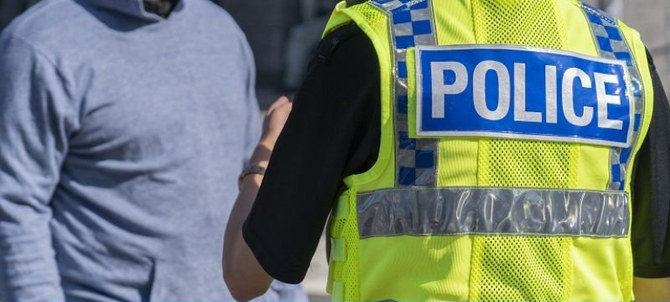
- Mohammed Adil, from Bradford in northern England, was arrested last November and charged following an investigation
- Adil, a police constable, has been suspended from his job with West Yorkshire Police and is due to appear in court on Thursday
LONDON: A British police officer has been charged with a terrorism offense for allegedly publishing an image in support of Hamas, a group banned in Britain as a terrorist organization, police said on Wednesday.
Mohammed Adil, 26, from Bradford in northern England, was arrested last November and charged following an investigation by British counter-terrorism officers, Counter Terrorism Policing North East said in a statement.
The police watchdog, the Independent Office for Police Conduct (IOPC), said the inquiries had focused on messages shared on WhatsApp which had concluded the case should be referred to prosecutors.
“On Monday, PC Mohammed Adil, 26, was charged with two counts of publishing an image in support of a proscribed organization, specifically Hamas, contrary to section 13 of the Terrorism Act,” the IOPC statement said. “The offenses are alleged to have taken place in October and November 2023.”
Adil, a police constable, has been suspended from his job with West Yorkshire Police and is due to appear before London Westminster Magistrates’ Court on Thursday.
Since the Oct. 7 attacks by Hamas on Israel, police have arrested and charged a number of people at pro-Palestinian protests in London for showing support for the group, while counter-terrorism commanders say they have also had a large amount of online content referred to them.


